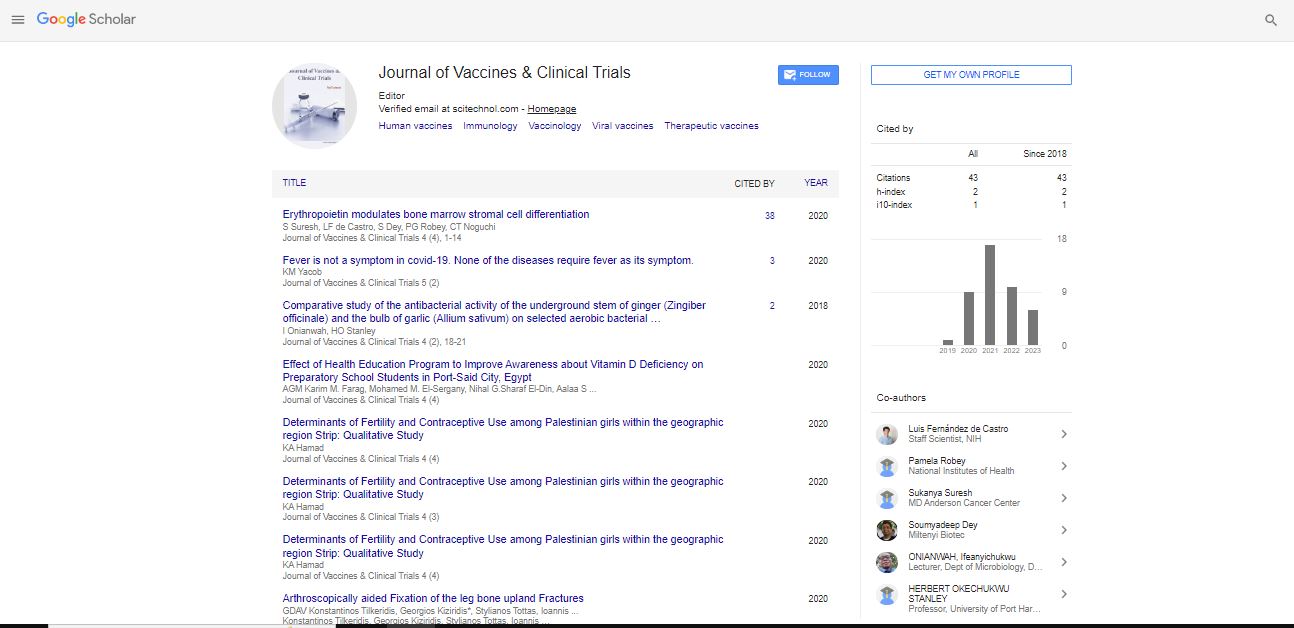Opinion Article, Jou Of Vac Cli Tr Vol: 7 Issue: 2
Influencing Antibody Persistence after Vaccination: Strengthening Belief in Vaccine Efficacy
Kikut Lüers*
1Department of Infectious Diseases, Austin Health, Heidelberg, Victoria, Australia
*Corresponding Author: Kikut Lüers,
Department of Infectious Diseases, Austin
Health, Heidelberg, Victoria, Australia
E-mail: Luerskut76@hotmail.com
Received date: 29 May, 2023, Manuscript No. JVCT-23-102732;
Editor assigned date: 31 May, 2023, PreQC No. JVCT-23-102732(PQ);
Reviewed date: 14 June, 2023, QCNo JVCT-23-102732;
Revised date: 21 June, 2023, Manuscript No. JVCT-23-102732(R);
Published date: 28 June, 2023, DOI: 10.4172/JVCT.100073
Citation: Lüers K (2023) Influencing Antibody Persistence after Vaccination: Strengthening Belief in Vaccine Efficacy. Jou of Vac Cli Tr 7:2.
Description
Vaccinations play an important role in preventing infectious diseases and reducing the burden of illness worldwide. One key aspect of vaccine effectiveness is the persistence of seroprotective levels of antibodies after vaccination. This study aims to review the existing evidence on the duration of vaccine-induced immunity and the longevity of seroprotective antibody levels. By understanding the persistence of antibodies, we can strengthen our belief in vaccine efficacy and optimize vaccination strategies for enhanced protection against infectious diseases. This study examines various factors influencing antibody persistence, the importance of booster doses, and the implications for public health.
Vaccines have proven to be highly effective in preventing infectious diseases. A important factor in vaccine efficacy is the persistence of seroprotective levels of antibodies following vaccination.
Antibody persistence after vaccination
This section explores the longevity of vaccine-induced antibody levels and their role in providing protection against specific diseases:
Immune memory: Vaccines stimulate the immune system to generate memory B cells and long-lived plasma cells, ensuring the production of specific antibodies upon exposure to the pathogen.
Antibody half-life: Antibodies produced in response to vaccination have varying half-lives, ranging from weeks to years, depending on the vaccine and pathogen.
Factors influencing antibody persistence
Several factors influence the persistence of seroprotective antibody levels after vaccination:
Vaccine type: Different vaccines elicit varying immune responses, leading to differences in antibody persistence. Some vaccines, such as those containing live attenuated viruses, can provide long-lasting immunity.
Pathogen characteristics: The characteristics of the targeted pathogen, such as its ability to evade the immune system or undergo antigenic changes, can impact antibody persistence.
Age and immune status: Factors such as age and immune status at the time of vaccination can influence the magnitude and duration of the immune response.
The role of booster doses
Booster doses are additional vaccine doses administered after the primary vaccination series. They play an important role in maintaining seroprotective antibody levels:
Reinforcing immunity: Booster doses stimulate a secondary immune response, leading to increased antibody production and enhanced immune memory.
Extending protection: Boosters help to extend the duration of seroprotection, especially for vaccines with waning antibody levels over time.
Public health implications
Understanding the persistence of seroprotective antibody levels after vaccination has significant implications for public health:
Vaccination strategies: Knowledge of antibody persistence can guide optimal vaccination schedules, including the timing of booster doses to ensure continuous protection.
Disease control: Assessing antibody persistence can inform decision-making regarding population-level immunity and the need for additional preventive measures.
Herd immunity: Understanding antibody persistence aids in estimating population-level protection and determining vaccination coverage required for achieving herd immunity.
Conclusion
The persistence of seroprotective levels of antibodies following vaccination is a crucial aspect of vaccine efficacy. Factors such as vaccine type, pathogen characteristics, and booster doses influence antibody longevity. Strengthening our belief in vaccine efficacy relies on understanding antibody persistence and its implications for public health. Continued research and surveillance are essential for optimizing vaccination strategies and ensuring long-term protection against infectious diseases.
 Spanish
Spanish  Chinese
Chinese  Russian
Russian  German
German  French
French  Japanese
Japanese  Portuguese
Portuguese  Hindi
Hindi 